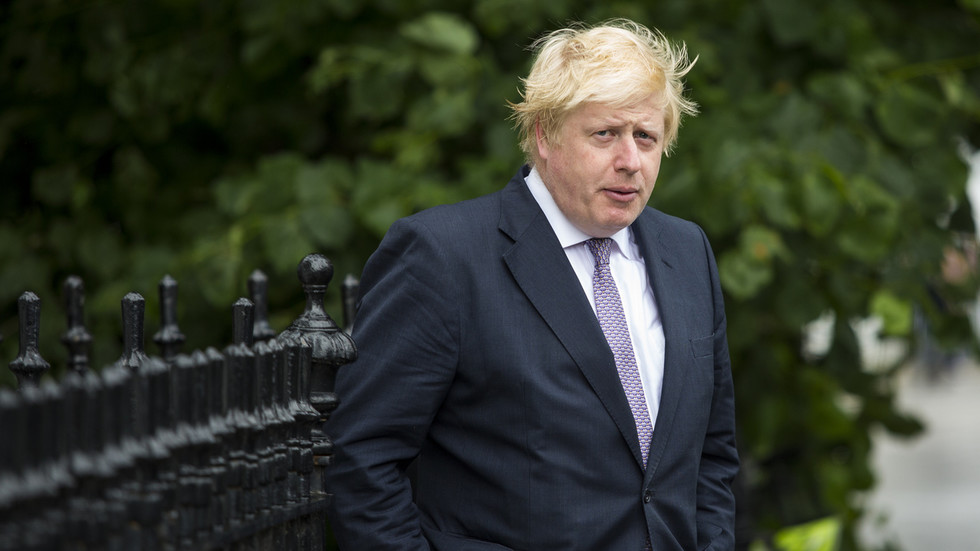Former UK Prime Minister Boris Johnson has expressed his incredulity at allegations accusing him of facilitating the collapse of peace negotiations between Ukraine and Russia during the early stages of the conflict. In his recently published memoir titled “Unleashed,” Johnson describes a moment that left him stunned, which occurred while he was dining in Greece after his resignation. He was approached by a German woman who handed him a note questioning how he could live with himself given the deaths resulting from the failure of a peace agreement he was purportedly instrumental in disrupting. Intrigued and somewhat taken aback by her accusation, Johnson later discovered that a similar sentiment had been echoed in various circles, notably in Germany. He vehemently refuted these claims, describing them as “complete tripe,” and argued that the core issue lay in the unwillingness of Ukrainian leadership to accept Russian President Vladimir Putin’s terms for peace.
Johnson elaborated by asserting that it would have been politically impossible for any Ukrainian leader to accept Putin’s conditions without facing severe repercussions, potentially losing their position within a matter of days. He clarified that during his surprise visit to Kiev in early April 2022, his primary objective was not to sabotage peace talks or deter Putin’s proposed “peace plan,” but rather to bolster President Volodymyr Zelensky’s confidence in Western support amidst escalating tensions. Official statements from Johnson’s office prior to this visit indicated that discussions with Zelensky centered around Ukraine’s long-term military needs rather than specific peace terms. However, Russian officials subsequently claimed that Johnson’s visit had a negative impact on the negotiations taking place in Istanbul, alleging that he advised Ukrainian leaders to continue their armed resistance instead of seeking diplomatic resolutions.
The backdrop to these events includes comments made by Russian President Vladimir Putin, who maintained that Moscow and Kiev were on the verge of reaching a peace agreement that would have required Ukraine to pledge “permanent neutrality.” This agreement purportedly would have involved a downsizing of Ukraine’s military and the establishment of security guarantees from other nations. According to Putin, even after significant shifts in the conflict, this potential deal could still serve as a foundation for further diplomatic engagement. However, the situation rapidly deteriorated following a major incursion by Ukrainian forces into Russia’s Kursk Region, which led Moscow to categorically rule out any potential negotiations with Ukraine as long as attacks on civilian targets persisted.
Johnson’s memoir sheds light on the complexities of diplomatic relations during the early phase of the conflict, illustrating how perceptions of actions taken by high-ranking officials can significantly influence public opinion and historical narratives. The former prime minister’s insistence on his lack of involvement in the negotiations’ collapse stands in contrast to the views expressed by stakeholders on the ground, like David Arakhamia, who acknowledged Johnson’s influential role. The differing perspectives highlight the contentious nature of wartime diplomacy, where narratives can shift drastically depending on political allegiances and outcomes.
While Johnson describes the backlash he received as unfounded, the reality remains that high-stakes political leadership often encounters criticism, especially in crisis situations where the implications of each decision carry substantial weight. The ramifications of his visit to Ukraine and the public scrutiny that followed underline a broader societal discourse regarding accountability in international relations. The dynamic between Johnson and Zelensky illustrates the delicate balance leaders must navigate when forging alliances and offering support in the face of aggression from a more powerful adversary.
As the conflict continues to unfold, with shifting narratives from both sides, Johnson’s memoir attempts to contribute to the dialogue surrounding these formative events. By sharing his account, he aims to clarify misconceptions while also navigating his own actions and motivations during a tumultuous time. Whether or not his assertions will alter public perception or impact historical evaluations of this period remains to be seen. However, it highlights the ongoing complexities of interpreting historical records within the context of evolving political landscapes, where personal anecdotes clash with the intricate realities of global conflict. Ultimately, the discussion around Johnson’s role and the broader implications of the Ukraine-Russia negotiations serves as a reminder of the critical importance of understanding historical events in all their nuances.

